As the world becomes more environmentally conscious, businesses are exploring ways to enhance their landscaping with eco-friendly gardening practices. Not only are these practices beneficial for the environment, but they can also positively impact personal well-being. In this post, we’ll provide actionable tips and tricks for businesses on Vancouver Island looking to make their gardens more sustainable.
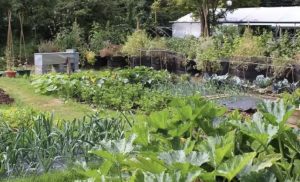
IslandEarth Landscape Company is a local business that specializes in eco-friendly landscaping practices. They understand the importance of sustainable gardening and strive to create beautiful and sustainable landscapes for their clients. With their expertise in using native and drought-tolerant plants, composting, natural pest control, and rainwater harvesting, they can help businesses on Vancouver Island create environmentally responsible and cost-effective landscapes. Their commitment to eco-friendly gardening practices sets them apart from traditional landscaping companies and showcases their dedication to promoting environmental responsibility. By partnering with IslandEarth Landscape Company, businesses can be assured that their landscapes will look beautiful, sustainable, and beneficial for the local ecosystem.
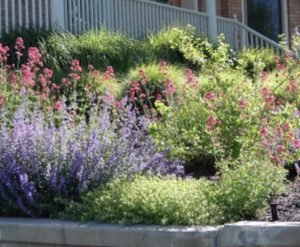
1. Use Native Plants
Using native plants is an essential aspect of eco-friendly gardening. Native plants are well-adapted to the region’s climate and soil conditions, making them easier to maintain and more resilient to pests and diseases. Additionally, native plants provide habitats and food sources for local wildlife, including birds, bees, and butterflies.
Some excellent native plants for Vancouver Island include Douglas fir, Sitka spruce, Pacific yew, salal, and red-flowering currant. Consider incorporating these plants into your landscaping to create a beautiful and sustainable garden.
2. Choose Drought-Tolerant Plants
Vancouver Island is known for its rainy climate, but businesses should consider the importance of drought-tolerant plants. Using plants that require less water can save money on water bills and reduce the environmental impact of landscaping. Plus, drought-tolerant plants are often low-maintenance and can thrive in poor soil conditions.
Some great drought-tolerant plants for Vancouver Island include lavender, yarrow, sea thrift, and stonecrop. These plants can add beautiful pops of colour to any garden while being eco-friendly.
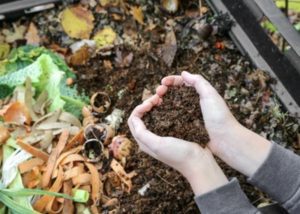
3. Compost
Composting is an eco-friendly gardening practice that can benefit any garden. Composting involves separating organic material, such as food waste and leaves, into nutrient-rich soil. This soil can be used to fertilize plants, reducing the need for chemical fertilizers.
To start composting, create a compost bin or pile in a sunny area of your garden. Add organic material, such as fruit and vegetable scraps, coffee grounds, and leaves, and turn the pile occasionally to promote decomposition. Over time, the material will break down into nutrient-rich soil that can be used to enhance your garden.
4. Use Natural Pest Control
Using natural pest control methods can help reduce the environmental impact of gardening while also protecting your plants from pests. Chemical pesticides can harm beneficial insects, such as bees and butterflies, and may even contaminate nearby water sources.
Some effective natural pest control methods include companion planting, which involves planting certain plants together to repel pests and using natural predators, such as ladybugs and praying mantises, to control insect populations.
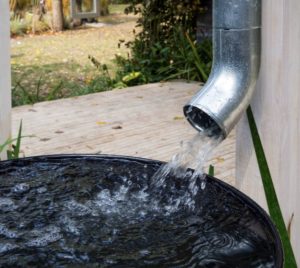
5. Consider Rainwater Harvesting
Rainwater harvesting involves collecting rainwater in a barrel or other container and using it to water plants. This practice can help reduce water bills and conserve water resources. Plus, rainwater is often free of the chemicals found in tap water, making it a healthier option for plants.
Place a barrel under a downspout on your property to start rainwater harvesting. When it rains, the barrel will collect water that can be used to water plants during dry periods.
Benefits of Eco-Friendly Gardening
Eco-friendly gardening practices offer many benefits for the environment and personal well-being. By using native plants, drought-tolerant plants, composting, natural pest control, and rainwater harvesting, businesses can create beautiful and sustainable gardens that enhance the local ecosystem. Additionally, eco-friendly gardening can reduce water bills, save money on fertilizers and pesticides, and promote a sense of well-being by connecting with nature.
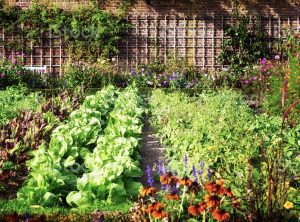
Cost-Effectiveness of Eco-Friendly Gardening
While some eco-friendly gardening practices, such as rainwater harvesting and composting, require an initial investment, they can ultimately save businesses money in the long run. For example, rainwater harvesting can reduce water bills, while composting can eliminate the need for chemical fertilizers. Additionally, native and drought-tolerant plants require less maintenance and are more resilient to pests and diseases, reducing the need for costly treatments.
In comparison, traditional gardening practices often rely heavily on chemical fertilizers and pesticides, which can be costly and have a negative impact on the environment. Additionally, traditional gardens often require more water, leading to higher water bills and potential waste of resources. By investing in eco-friendly gardening practices, businesses can benefit the environment and save money in the long run.
Conclusion
Eco-friendly gardening practices offer numerous benefits for businesses on Vancouver Island looking to enhance their landscaping. By using native and drought-tolerant plants, composting, natural pest control, and rainwater harvesting, businesses can create beautiful and sustainable gardens while promoting environmental responsibility and personal well-being. Additionally, eco-friendly gardening practices can be cost-effective in the long run, saving businesses money on water bills, fertilizers, and pesticides. By taking these steps, businesses can positively impact their local ecosystem while enhancing their own surroundings.